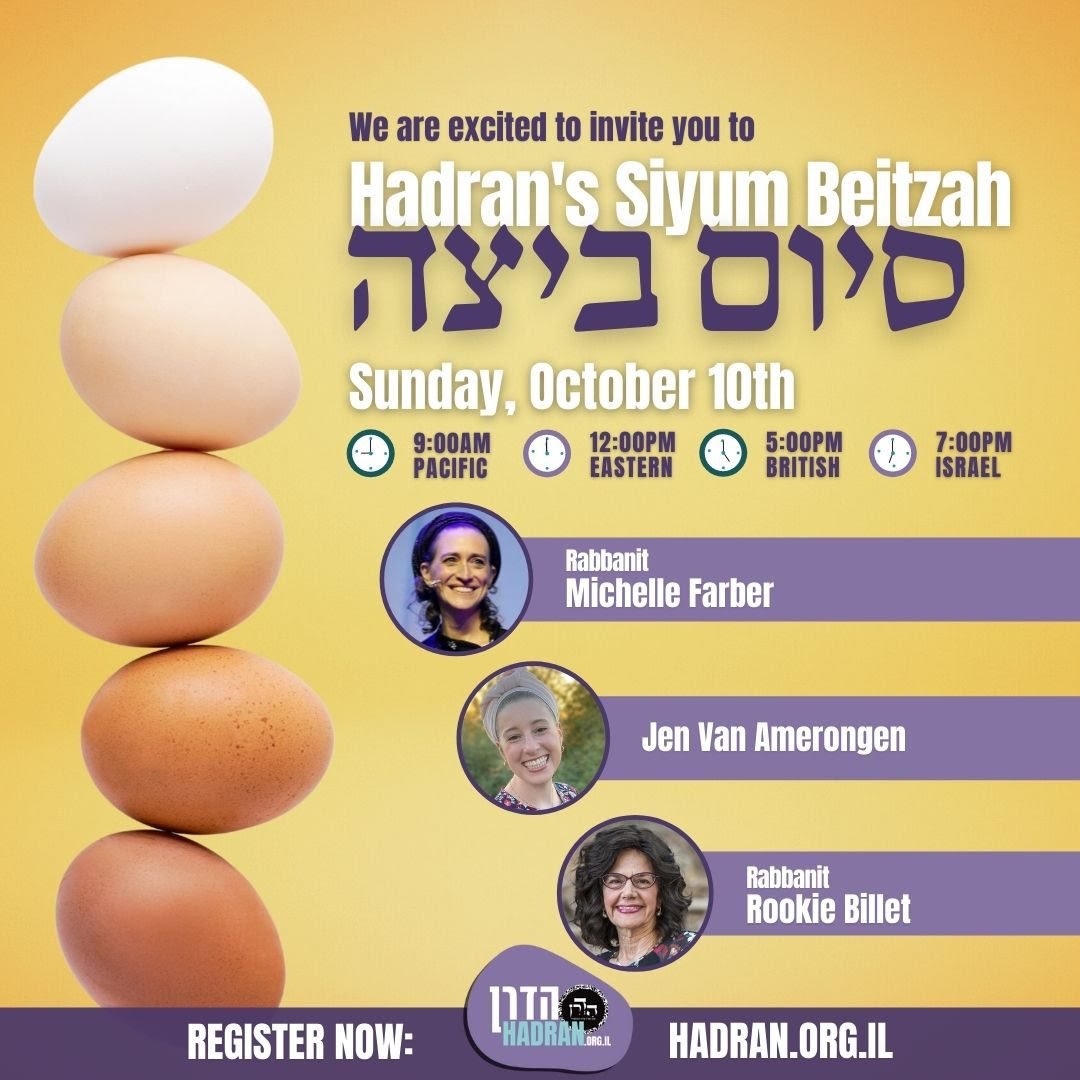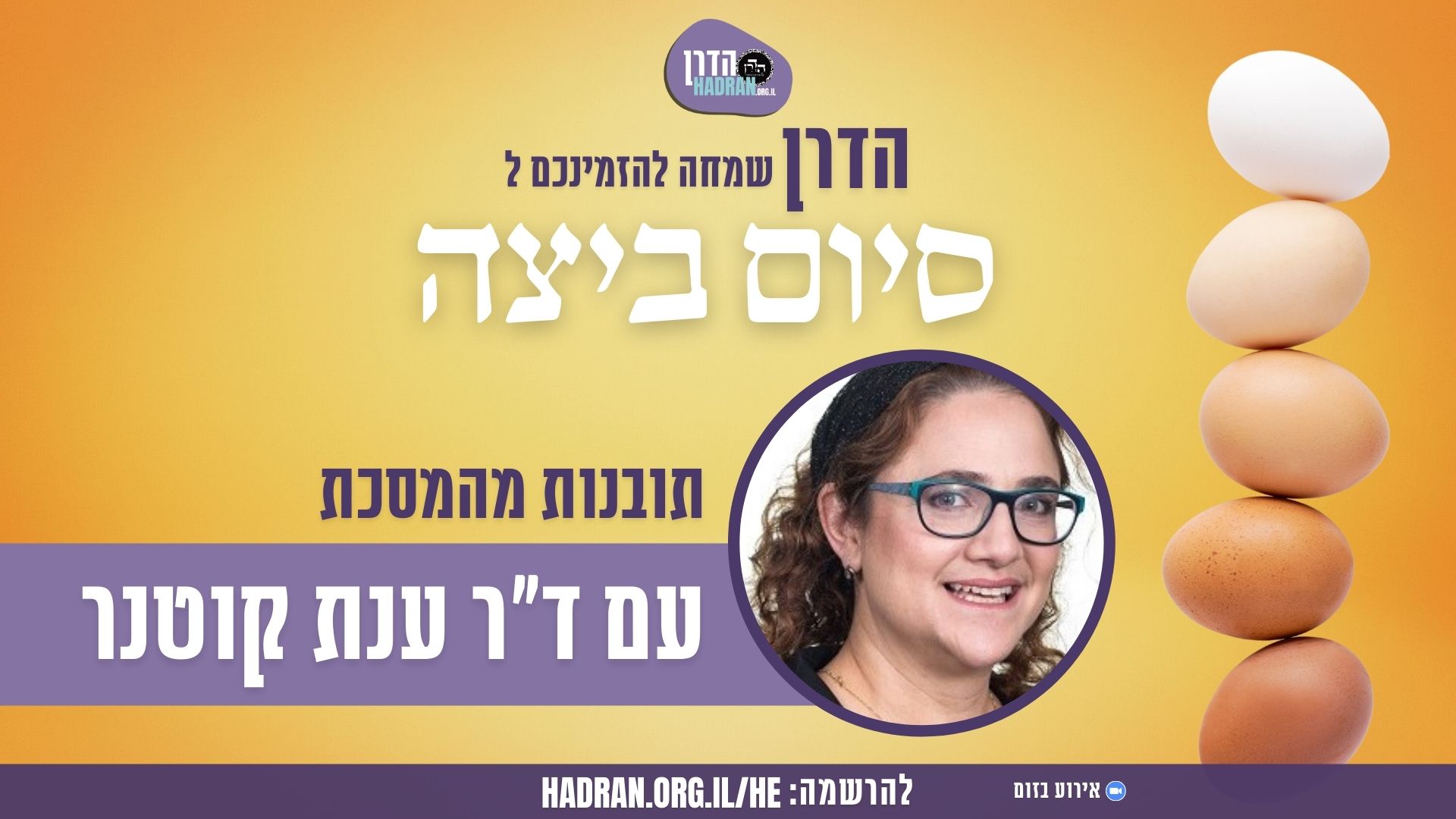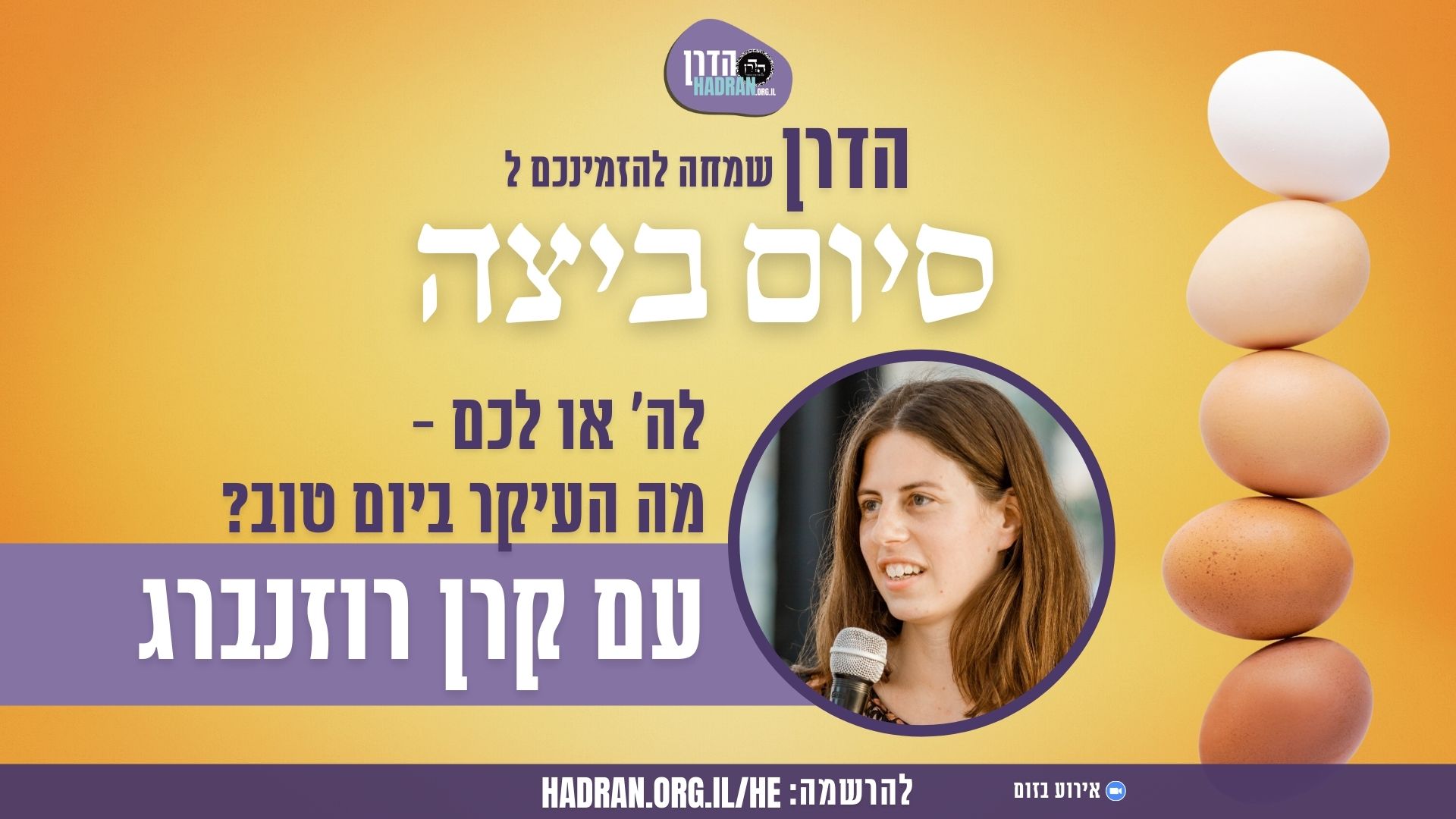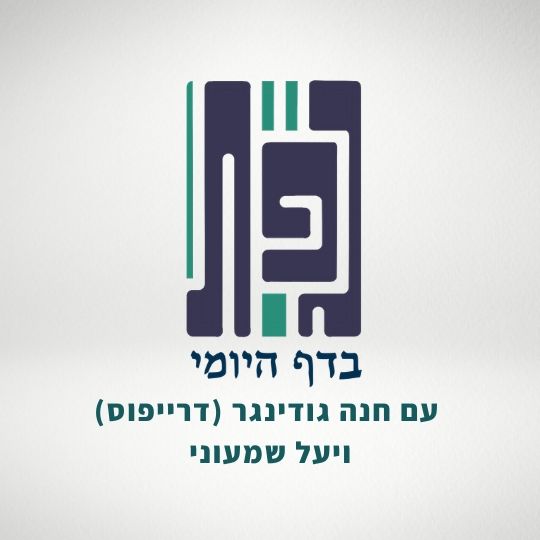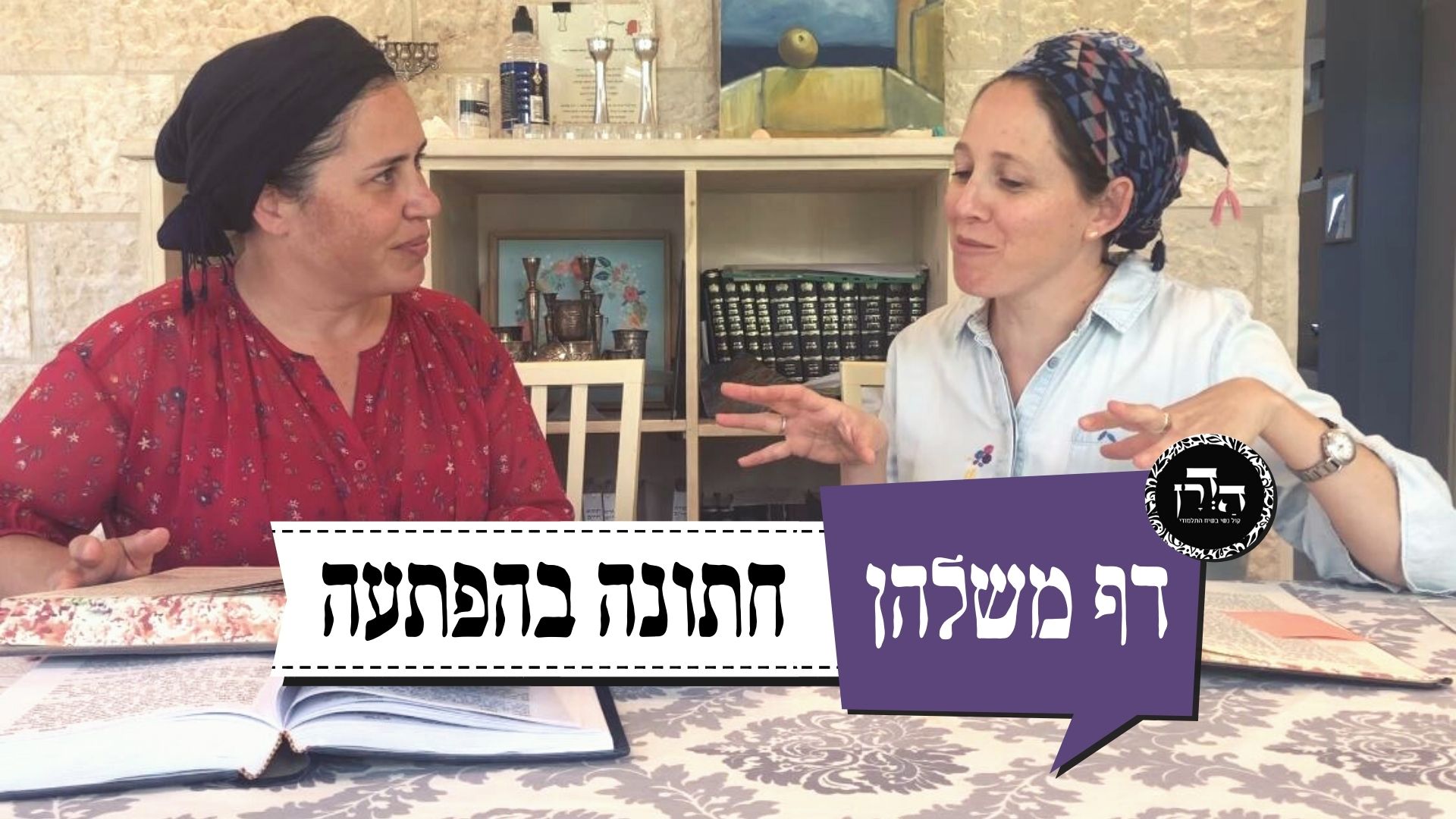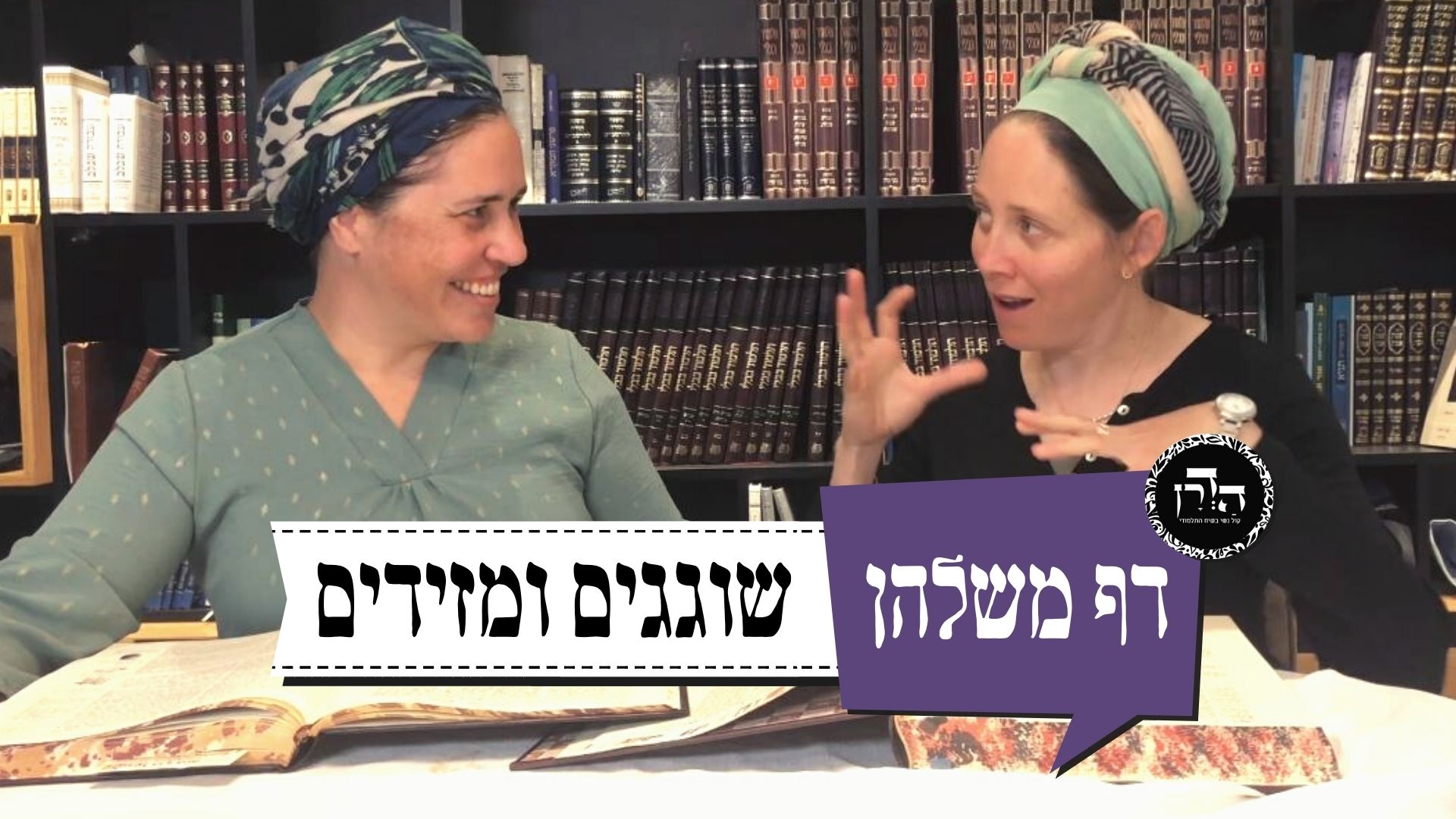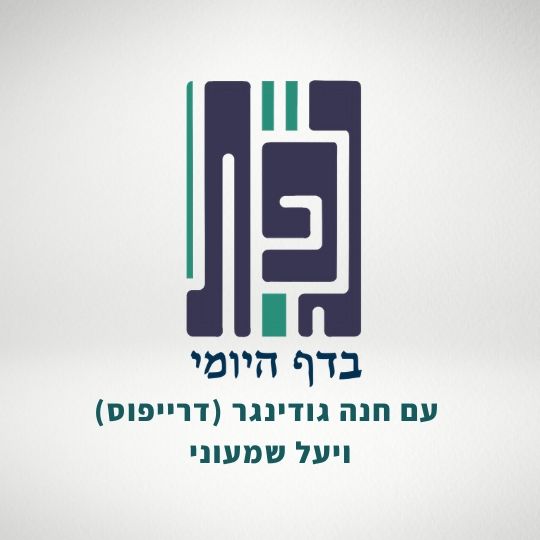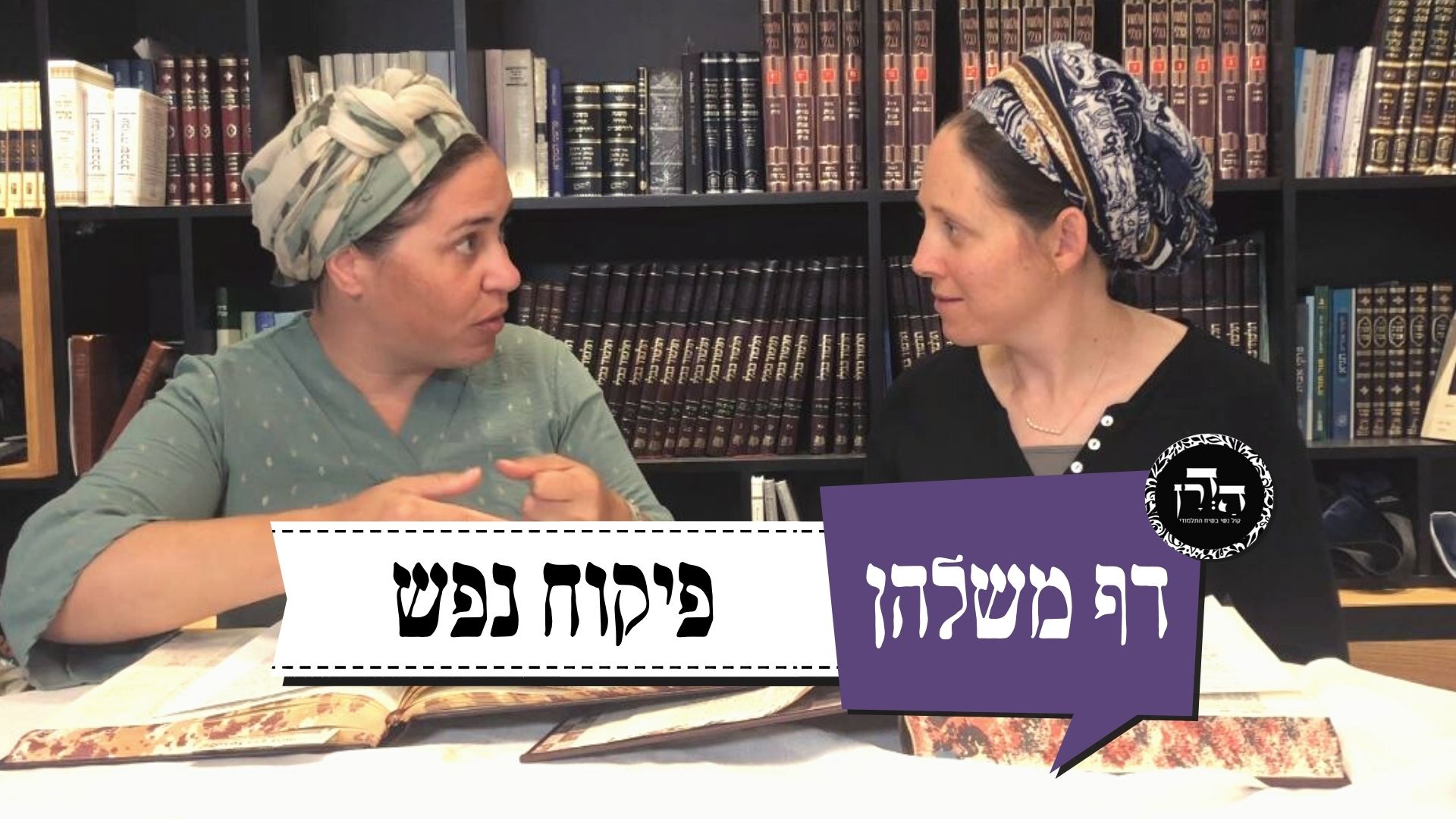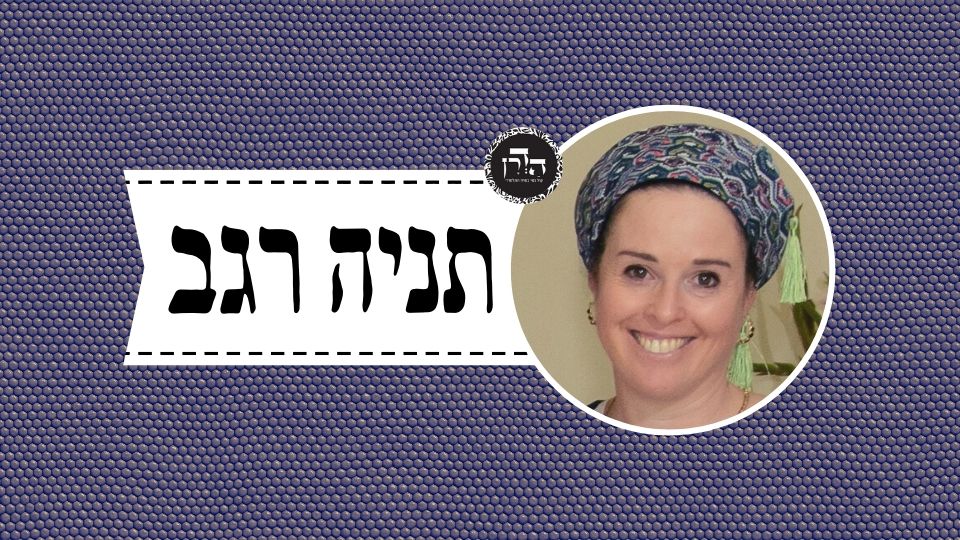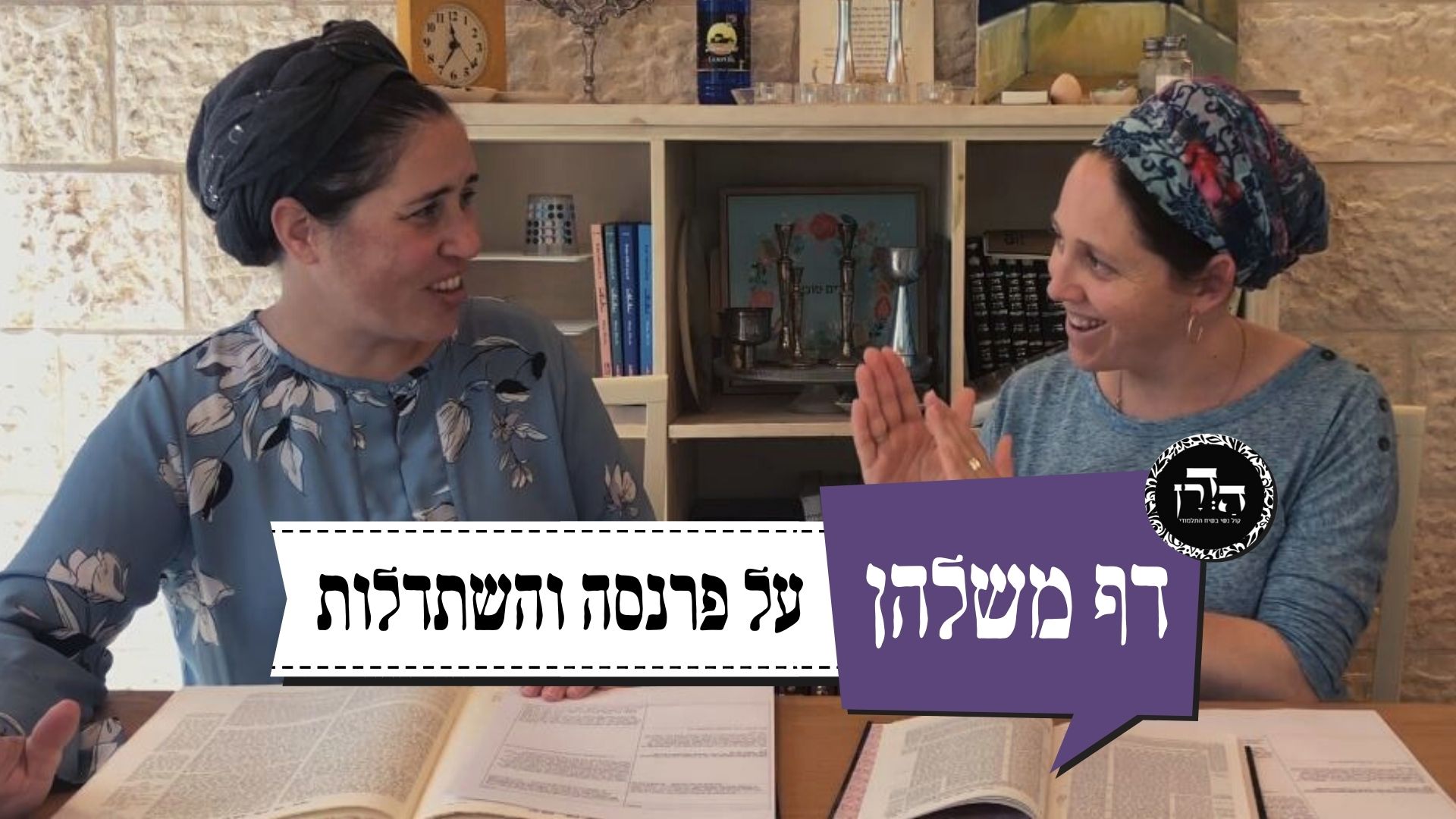ביצה י
אֲבָל הֵיכָא דְּלֵיכָּא דָּקָר נָעוּץ — לָא. אִי נָמֵי: עַד כָּאן לָא קָאָמְרִי בֵּית הִלֵּל הָכָא, אֶלָּא כֵּיוָן דְּמוּקְצֶה הוּא, בְּעוֹמֵד וְאוֹמֵר זֶה וְזֶה אֲנִי נוֹטֵל סַגִּי. אֲבָל הָתָם — לָא.
However, where there is no embedded shovel, even Beit Shammai did not permit it. Alternatively, it is possible that Beit Hillel say their opinion only here, since a dove is muktze, which is prohibited by rabbinic law, and therefore when he stands and says: I will take this and that, it is enough. However there, where the prohibition applies by Torah law, they did not say so.
אֶלָּא, אִי קַשְׁיָא — הָא קַשְׁיָא: בֵּית שַׁמַּאי אוֹמְרִים: אֵין נוֹטְלִין אֶת הָעֱלִי, לְקַצֵּב עָלָיו בָּשָׂר, וּבֵית הִלֵּל מַתִּירִין. אַלְמָא גַּבֵּי שִׂמְחַת יוֹם טוֹב בֵּית שַׁמַּאי לְחוּמְרָא וּבֵית הִלֵּל לְקוּלָּא, וּרְמִינְהִי הַשּׁוֹחֵט חַיָּה וָעוֹף, בֵּית שַׁמַּאי וְכוּ׳! אָמַר רַבִּי יוֹחָנָן: מוּחְלֶפֶת הַשִּׁיטָה.
Rather, if there is a difficulty involving a contradiction, this is the difficulty, from a different mishna (11a): Beit Shammai say: One may not take a large pestle from a mortar, which is normally used for crushing wheat in the preparation of porridge, for any other purpose on a Festival, e.g., to cut meat on it; and Beit Hillel permit it. Apparently, with regard to rejoicing on the Festival, the opinion of Beit Shammai is stringent, and that of Beit Hillel is lenient. And the Gemara raises a contradiction: With regard to one who slaughters an undomesticated animal or a fowl on a Festival, Beit Shammai say: He may dig earth with a shovel and cover the blood, and Beit Hillel say: He may not slaughter an undomesticated animal or a fowl, unless he had earth prepared for that purpose while it was still day. It was in this regard that Rabbi Yoḥanan said: The attribution of the opinions is reversed.
מִמַּאי? דִּלְמָא לָא הִיא: עַד כָּאן לָא קָאָמְרִי בֵּית שַׁמַּאי הָתָם אֶלָּא הֵיכָא דְּאִיכָּא דָּקָר נָעוּץ, אֲבָל הֵיכָא דְּלֵיכָּא דָּקָר נָעוּץ — לָא, אִי נָמֵי: עַד כָּאן לָא קָאָמְרִי בֵּית הִלֵּל הָכָא אֶלָּא, דְּאִיכָּא תּוֹרַת כְּלִי עָלָיו, אֲבָל הָתָם לָא.
The Gemara rejects this: From where do you know this? Perhaps it is not so. Rather, Beit Shammai say their opinion only there, where there is a shovel embedded and prepared the day before, but where there is no embedded shovel, they did not rule leniently. Alternatively, one can say that Beit Hillel say their opinion only here, with regard to a pestle, which at least has the status of a vessel, and therefore it is not completely muktze. However, there, in the case of slaughtering, Beit Hillel did not issue a lenient ruling.
אֶלָּא, אִי קַשְׁיָא — הָא קַשְׁיָא: בֵּית שַׁמַּאי אוֹמְרִים: אֵין נוֹתְנִין אֶת הָעוֹר לִפְנֵי הַדּוֹרְסָן, וְלֹא יַגְבִּיהֶנּוּ אֶלָּא אִם כֵּן יֵשׁ עָלָיו כְּזַיִת בָּשָׂר. וּבֵית הִלֵּל מַתִּירִין.
Rather, if there is a difficulty, this is the difficulty: It is taught in a mishna (11a): Beit Shammai say: One may not place an unprocessed hide before those who will tread on it, as this is an instance of the prohibited labor of tanning on a Festival. And one may not lift the hide from its spot, as it is considered muktze, unless there is an olive-bulk of meat on it, in which case it may be carried on account of its meat. And Beit Hillel permit one to place a hide before those who will tread upon it.
אַלְמָא, גַּבֵּי שִׂמְחַת יוֹם טוֹב בֵּית שַׁמַּאי לְחוּמְרָא וּבֵית הִלֵּל לְקוּלָּא, וּרְמִינְהִי: הַשּׁוֹחֵט חַיָּה וְעוֹף בְּיוֹם טוֹב וְכוּ׳, אָמַר רַבִּי יוֹחָנָן: מוּחְלֶפֶת הַשִּׁיטָה.
Once again the Gemara states: Apparently, with regard to rejoicing on the Festival, the opinion of Beit Shammai is stringent, and that of Beit Hillel is lenient. And the Gemara raises a contradiction: With regard to one who slaughters an undomesticated animal or a fowl on a Festival, Beit Shammai say, etc. Concerning this case, Rabbi Yoḥanan said: The attribution of the opinions is reversed.
מִמַּאי? דִּלְמָא לָא הִיא: עַד כָּאן לָא קָאָמְרִי בֵּית שַׁמַּאי הָתָם אֶלָּא הֵיכָא דְּאִיכָּא דָּקָר נָעוּץ, אֲבָל הֵיכָא דְּלֵיכָּא דָּקָר נָעוּץ — לָא. אִי נָמֵי: עַד כָּאן לָא קָאָמְרִי בֵּית הִלֵּל הָכָא, אֶלָּא דַּחֲזֵי לְמִזְגֵּא עִלָּוֵיהּ, אֲבָל הָתָם לָא.
Here too, the Gemara rejects this: From where do you know this? Perhaps that is not so. Rather, Beit Shammai say their opinion only there, where there is a shovel embedded and prepared the day before, but where there is no embedded shovel, they did not rule leniently. Alternatively, Beit Hillel say their opinion only here, with regard to a hide, which is suitable for people to recline upon, and therefore it is not completely muktze. However, there, in the case of slaughtering, they were not lenient.
אֶלָּא, אִי קַשְׁיָא — הָא קַשְׁיָא: בֵּית שַׁמַּאי אוֹמְרִים: אֵין מְסַלְּקִין אֶת הַתְּרִיסִין בְּיוֹם טוֹב, וּבֵית הִלֵּל מַתִּירִין אַף לְהַחְזִיר. אַלְמָא, גַּבֵּי שִׂמְחַת יוֹם טוֹב בֵּית שַׁמַּאי לְחוּמְרָא וּבֵית הִלֵּל לְקוּלָּא, וּרְמִינְהִי: הַשּׁוֹחֵט חַיָּה וְעוֹף בְּיוֹם טוֹב וְכוּ׳.
Rather, if there is a difficulty, this is the difficulty, as it is taught (11a): Beit Shammai say: One may not remove the shutters of a store on a Festival, to open the store by raising them, due to the prohibition against building and demolishing on a Festival; and Beit Hillel permit not only to open the shutters, but even to replace them. Apparently, with regard to rejoicing on the Festival, the opinion of Beit Shammai is stringent, and that of Beit Hillel is lenient. And the Gemara raises a contradiction: With regard to one who slaughters an undomesticated animal or a fowl on a Festival, Beit Shammai say, etc.
בִּשְׁלָמָא בֵּית שַׁמַּאי אַבֵּית שַׁמַּאי לָא קַשְׁיָא: הָתָם דְּאִיכָּא דָּקָר נָעוּץ, הָכָא לֵיכָּא דָּקָר נָעוּץ. אֶלָּא בֵּית הִלֵּל אַבֵּית הִלֵּל קַשְׁיָא!
Granted, the contradiction between one statement of Beit Shammai and the other statement of Beit Shammai is not difficult, as it can be explained as follows: There, in the slaughtering case, it is referring to a situation where there is a shovel embedded and prepared the day before; here, there is no embedded shovel, and therefore Beit Shammai are stringent. However, the contradiction between one statement of Beit Hillel and the other statement of Beit Hillel is difficult.
אָמַר רַבִּי יוֹחָנָן: מוּחְלֶפֶת הַשִּׁיטָה. (אִי נָמֵי:) עַד כָּאן לָא קָאָמְרִי בֵּית הִלֵּל הָכָא, אֶלָּא מִשּׁוּם דְּאֵין בִּנְיָן בְּכֵלִים וְאֵין סְתִירָה בְּכֵלִים. אֲבָל הָתָם — לָא.
It is with regard to this contradiction that Rabbi Yoḥanan said: The attribution of the opinions is reversed. The Gemara comments: Alternatively, one can suggest a different answer without reversing the opinions: Beit Hillel say their lenient opinion only here, in the case of the shutters, because they maintain that there is no prohibition against building with regard to vessels and there is no prohibition against dismantling with regard to vessels, which means that no Torah prohibition is violated in removing the shutters. However, there, in the case of slaughtering, where there are no extenuating circumstances, Beit Hillel did not permit it. Consequently, there is no contradiction that necessitates a reversal of the opinions.
מַתְנִי׳ בֵּית שַׁמַּאי אוֹמְרִים: לֹא יִטּוֹל אֶלָּא אִם כֵּן נִעְנַע מִבְּעוֹד יוֹם. וּבֵית הִלֵּל אוֹמְרִים: עוֹמֵד וְאוֹמֵר ״זֶה וָזֶה אֲנִי נוֹטֵל״.
MISHNA: Beit Shammai say: One may not take fledgling doves from a dovecote on a Festival, unless he shook the ones he wished to take while it was still day, thereby preparing them. And Beit Hillel say: It is not necessary to shake; rather, it is sufficient if one stands the day before and says: I will take this fledgling and that one.
גְּמָ׳ אָמַר רַב חָנָן בַּר אַמֵּי: מַחְלוֹקֶת בִּבְרִיכָה רִאשׁוֹנָה, דְּבֵית שַׁמַּאי סָבְרִי: גָּזְרִינַן דִּלְמָא אָתֵי לְאִמְּלוֹכֵי.
GEMARA: Rav Ḥanan bar Ami said: The dispute between Beit Shammai and Beit Hillel applies to the first brood, the first pair of fledglings hatched in the first month of the year from a pair of doves. Those fledglings are usually left in the nest and are not used for food. As Beit Shammai hold: We issue a decree prohibiting taking them, as perhaps on the Festival he will come to reconsider after handling them and decide to leave them in their place, in which case he has moved them unnecessarily. However, once he has already shaken them, there is no further concern that he might change his mind on the Festival itself.
וּבֵית הִלֵּל סָבְרִי: לָא גָּזְרִינַן. אֲבָל בִּבְרִיכָה שְׁנִיָּה — דִּבְרֵי הַכֹּל בְּעוֹמֵד וְאוֹמֵר ״זֶה וָזֶה אֲנִי נוֹטֵל״ סַגִּיא.
And Beit Hillel hold: We do not issue a decree, as there is no concern that one might change his mind, and therefore a verbal commitment is sufficient. However, with regard to the second brood, the fledglings born on the second cycle in the following month, everyone agrees that it is enough for one to stand and say: I will take this one and that one.
וּבֵית הִלֵּל — לְמָה לֵיהּ לְמֵימַר ״זֶה וָזֶה אֲנִי נוֹטֵל״? לֵימָא: ״מִכָּאן אֲנִי נוֹטֵל לְמָחָר״?
The Gemara asks: And according to the opinion of Beit Hillel, why does one need to say: I will take this one and that one? Let him say: From here, this dovecote, I will take tomorrow. Why does one have to specify exactly which fledglings he plans to remove from the dovecote?
וְכִי תֵּימָא בֵּית הִלֵּל לֵית לְהוּ בְּרֵירָה, וְהָתְנַן: הַמֵּת בַּבַּיִת וְלוֹ פְּתָחִים הַרְבֵּה — כּוּלָּן טְמֵאִים.
And if you say that Beit Hillel do not accept the principle of retroactive designation, i.e., they reject the idea that a person’s original intention can be clarified retroactively, and therefore it cannot be said that the fledglings one takes on the Festival were the ones he had in mind beforehand, but didn’t we learn in a mishna (Ohalot 7:3): If a corpse is located in a house, and the house has many entrances, whether they are open or closed, not only is the inside of the house ritually impure as a tent of the dead, but all the entrances are likewise ritually impure and impart impurity to the vessels they contain? The reason is that the corpse might be removed via any of the entrances, and therefore they all contract impurity.
נִפְתַּח אֶחָד מֵהֶן, הוּא טָמֵא, וְכוּלָּן טְהוֹרִין. חִשֵּׁב לְהוֹצִיאוֹ בְּאֶחָד מֵהֶן, אוֹ בְּחַלּוֹן שֶׁיֵּשׁ בּוֹ אַרְבָּעָה עַל אַרְבָּעָה — מַצֶּלֶת עַל כׇּל הַפְּתָחִים כּוּלָּן.
If only one of the entrances was open after the person died, that entrance alone is ritually impure, as the corpse will certainly be removed through it, and all the other entrances remain ritually pure. The same applies if one decided from the outset to remove the corpse through one of the entrances, or to carry it out through a window that is four by four handbreadths in size, which is large enough for a corpse. This intention spares all the other entrances from ritual impurity, as it is clear that the corpse will not be removed through them.
בֵּית שַׁמַּאי אוֹמְרִים: וְהוּא שֶׁחִשֵּׁב לְהוֹצִיאוֹ עַד שֶׁלֹּא יָמוּת הַמֵּת, וּבֵית הִלֵּל אוֹמְרִים: אַף מִשֶּׁיָּמוּת הַמֵּת.
With regard to this case, Beit Shammai say: This halakha applies only if one had decided to remove the corpse by a particular entrance before the person died, so that the entrance through which the body would be removed was already determined at the time of death. And Beit Hillel say: This halakha applies even after the person died, as the principle of retroactive designation is invoked, which means that the entrance through which the deceased will be removed is retroactively designated. This indicates that Beit Hillel do accept the principle of retroactive designation.
הָא אִתְּמַר עֲלַהּ, אָמַר רַבָּה: לְטַהֵר אֶת הַפְּתָחִים מִכָּאן וּלְהַבָּא. וְכֵן אָמַר רַבִּי אוֹשַׁעְיָא: לְטַהֵר אֶת הַפְּתָחִים מִכָּאן וּלְהַבָּא. מִכָּאן וּלְהַבָּא — אִין, לְמַפְרֵעַ — לָא.
The Gemara refutes this proof: Wasn’t it stated by amora’im with regard to this mishna that Rabba said: In this case, Beit Hillel referred only to purifying the entrances from that point forward. In other words, after one has decided on an entrance that he will use to remove the dead, any vessels in the space of the other entrances do not become ritually impure. However, vessels that were located inside the space of the other entrances before the decision was made remain impure. According to these amora’im, Beit Hillel do not accept the principle of retroactive designation. And, so too, Rav Oshaya said: This halakha is referring to purifying the entrances from that point forward, which indicates: From here onward, yes, the entrances are ritually pure; retroactively, no, they are not considered pure.
רָבָא אָמַר: לְעוֹלָם לְמַפְרֵעַ, וְהָכָא הַיְינוּ טַעְמָא: דִּלְמָא מְטַלְטֵל וְשָׁבֵיק, מְטַלְטֵל וְשָׁבֵיק, וְקָא מְטַלְטֵל מִידֵּי דְּלָא חֲזֵי לֵיהּ.
Rava said that there is a different way to resolve the conflicting rulings of Beit Hillel: Actually, in the case of ritual impurity, Beit Hillel maintain that all the entrances are ritually pure retroactively. And here, with regard to fledglings, this is the reason why Beit Hillel insist that one designate which particular fledglings one plans to take on the Festival: Perhaps one will move fledglings, and put them down, and again move them, and put them down until he finds the pair he wants, thereby moving an object that is not suitable for him, i.e., which is muktze.
וְהָא אָמְרַתְּ — בְּעוֹמֵד וְאוֹמֵר ״זֶה וָזֶה אֲנִי נוֹטֵל״ סַגִּיא! הָנֵי מִילֵּי מֵעֶרֶב יוֹם טוֹב,
The Gemara raises an objection: But if this is indeed the concern, didn’t you say that it is enough if one stands and says: I will take this one and that one. In this case, too, he does not touch them. It is therefore possible that he may reconsider his choice of fledglings on the Festival after he handles them. The Gemara answers: This applies only when one made his choice on the eve of the Festival. Since he knows that he may not alter his decision on the Festival itself even if he does not like the ones he chose, he definitively decides to take those fledglings and will not handle others.
אֲבָל בְּיוֹם טוֹב אָסוּר, דְּזִימְנִין דְּמִשְׁתַּכְחִי שְׁמֵנִים כְּחוּשִׁים וּכְחוּשִׁים שְׁמֵנִים, וְקָמְטַלְטֵל מִידֵּי דְּלָא חֲזֵי לֵיהּ. אִי נָמֵי זִימְנִין דְּמִשְׁתַּכְחִי כֻּלְּהוּ כְּחוּשִׁים וְשָׁבֵיק לְהוּ, וְאָתֵי לְאִמְּנוֹעֵי מִשִּׂמְחַת יוֹם טוֹב.
However, on the Festival it is prohibited, as sometimes those that seemed to him to be fat ones will be found to be thin, and thin ones will be found to be fat, and he will move an object that is not suitable for him, thereby transgressing the prohibition against moving muktze objects. Alternatively, sometimes they will all be found to be thin, and he will leave them all, and he will come to neglect the rejoicing of the Festival. If, however, one announces the day before: I will take this one and that one, he will indeed take only those fledglings, thereby enhancing his Festival joy.
מַתְנִי׳ זִמֵּן שְׁחוֹרִים וּמָצָא לְבָנִים, לְבָנִים וּמָצָא שְׁחוֹרִים, שְׁנַיִם וּמָצָא שְׁלֹשָׁה — אֲסוּרִים. שְׁלֹשָׁה וּמָצָא שְׁנַיִם — מוּתָּרִים.
MISHNA: If, on the eve of a Festival, one designated black fledglings to be slaughtered, and on the following day found white ones in the dovecote, rather than the birds he had designated, or if one designated white ones to be slaughtered and found black ones, or if one designated two fledglings to be slaughtered and found three, they are prohibited, as these are not the same fledglings he had designated earlier. If, however, one designated three to be slaughtered and found only two, they are permitted, as it is presumed that one of the fledglings escaped.
בְּתוֹךְ הַקֵּן וּמָצָא לִפְנֵי הַקֵּן — אֲסוּרִין, וְאִם אֵין שָׁם אֶלָּא הֵם — הֲרֵי אֵלּוּ מוּתָּרִים.
If one designated them inside the nest and the next day he cannot find them there, and he found fledglings before the nest, they are prohibited, as they might be fledglings other than the ones he designated and left inside the nest. But if there are only those fledglings in the immediate vicinity, they are permitted, as it can be assumed that these are the ones he designated inside the nest.
גְּמָ׳ פְּשִׁיטָא! אָמַר רַבָּה: הָכָא בְּמַאי עָסְקִינַן, כְּגוֹן שֶׁזִּמֵּן שְׁחוֹרִים וּלְבָנִים, וְהִשְׁכִּים וּמָצָא שְׁחוֹרִים בִּמְקוֹם לְבָנִים וּלְבָנִים בִּמְקוֹם שְׁחוֹרִים. מַהוּ דְּתֵימָא: הָנֵי אִינְהוּ נִינְהוּ וְאִתְהֲפוֹכֵי אִתְהֲפוּךְ, קָא מַשְׁמַע לַן: הָנָךְ אֲזַדוּ לְעָלְמָא, וְהָנֵי אַחֲרִינֵי נִינְהוּ.
GEMARA: The Gemara asks: But it is obvious that if one designated black ones to be slaughtered and found white ones, they are not the same birds. Rabba said: With what are we dealing here? The mishna is referring to a case where one designated both black and white ones to be slaughtered, and he arose and found black ones in the place where the white ones had been, and white ones in the place of the black ones. Lest you say: These are those same fledglings and they simply exchanged places, the mishna teaches us that this claim is not accepted. Instead, it is assumed that these ones that he designated have gone to the outside world, and these ones that he found are others that have come from elsewhere.
לֵימָא מְסַיַּיע לֵיהּ לְרַבִּי חֲנִינָא. דְּאָמַר רַבִּי חֲנִינָא: רוֹב וְקָרוֹב — הַלֵּךְ אַחַר הָרוֹב!
The Gemara suggests: Let us say that this mishna supports Rabbi Ḥanina, as Rabbi Ḥanina said: When resolving an uncertainty with regard to the identity of an item, if the majority indicates one ruling but the item in question is proximate to a source that indicates otherwise, one follows the majority. In this case, the majority of fledglings are prohibited, as they were not designated for use on the Festival. Consequently, the found fledglings are prohibited, despite the fact that the nearest fledglings are the designated ones.
כִּדְאָמַר אַבָּיֵי — בְּדַף, הָכָא נָמֵי — בְּדַף.
The Gemara refutes this suggestion: Perhaps it is as Abaye said with regard to a different issue: We are dealing with fledglings located on a ledge, a flat piece of wood protruding from the dovecote, around which many doves congregate. Here too, the mishna is referring to a ledge. Since other doves are regularly found there, the principle that one follows the majority rather than the proximate source does not apply, as both the majority of doves and the proximate source of doves are not the original ones, and therefore all the fledglings are prohibited.
שְׁנַיִם וּמָצָא שְׁלֹשָׁה — אֲסוּרִין. מָה נַפְשָׁךְ: אִי אַחֲרִינֵי נִינְהוּ — הָא אַחֲרִינֵי נִינְהוּ, וְאִי לָא אַחֲרִינֵי נִינְהוּ — הָא אִיכָּא חַד דִּמְעָרַב בְּהוּ.
The mishna taught that if one designated two and found three, they are prohibited. The Gemara explains: Whichever way you look at this matter, the fledglings are prohibited. If these are others, they are others that have not been designated. And if they are not others, i.e., two of the fledglings that one designated are still there, nevertheless there is one that he certainly did not designate and that is mingled with them, which renders the others prohibited as well.
שְׁלֹשָׁה וּמָצָא שְׁנַיִם מוּתָּרִין. מַאי טַעְמָא? הָנֵי אִינְהוּ נִינְהוּ, וְחַד מִנַּיְיהוּ אֲזַל לְעָלְמָא.
§ The mishna taught that if one designated three and found two, they are permitted. The Gemara asks: What is the reason for this? The Gemara explains: These are the same ones, and one of them has gone to the outside world, leaving two behind.
לֵימָא מַתְנִיתִין רַבִּי הִיא וְלָא רַבָּנַן, דְּתַנְיָא: הִנִּיחַ מָנֶה וּמָצָא מָאתַיִם — חוּלִּין וּמַעֲשֵׂר שֵׁנִי מְעוֹרָבִין זֶה בָּזֶה, דִּבְרֵי רַבִּי. וַחֲכָמִים אוֹמְרִים: הַכֹּל חוּלִּין.
The Gemara suggests: Let us say that the mishna is in accordance with the opinion of Rabbi Yehuda HaNasi, and not that of the Rabbis, as it is taught in a baraita: If one placed one hundred dinars of tithe money in a safe place and found two hundred there, it is assumed that this is non-sacred money and second-tithe money mingled together. Someone must have come and added another hundred to his tithe money. Therefore, he separates one dinar from the total and states: Whatever part of this is the tithe, is fine; whatever part of it is non-tithe money, let it be used to redeem the tithe money, and this should be sanctified as tithe money in its place. This is the statement of Rabbi Yehuda HaNasi. And the Rabbis say: It is all non-sacred money. Since the money is not as he left it, the assumption is that someone took the original one hundred dinars; and he, or someone else, replaced it with two hundred dinars of regular money.
הִנִּיחַ מָאתַיִם וּמָצָא מָנֶה, מָנֶה מוּנָּח וּמָנֶה מוּטָל, דִּבְרֵי רַבִּי. וַחֲכָמִים אוֹמְרִים: הַכֹּל חוּלִּין!
Conversely, if one placed two hundred dinars and found one hundred dinars, it is presumed that one hundred dinars has been left in its place and is tithe money, and one hundred dinars was removed. This is the statement of Rabbi Yehuda HaNasi. And the Rabbis say: It is all non-sacred money. It is assumed that someone removed all the money, and the one hundred dinars he found must have been placed there by someone else, and is not connected to the money he left. The halakha with regard to the case of fledglings apparently follows Rabbi Yehuda HaNasi’s opinion in the case of second-tithe money.
אֲפִילּוּ תֵּימָא רַבָּנַן, הָא אִתְּמַר עֲלַהּ: רַבִּי יוֹחָנָן וְרַבִּי אֶלְעָזָר דְאָמְרִי תַּרְוַיְיהוּ: שָׁאנֵי גּוֹזָלוֹת, הוֹאִיל וַעֲשׂוּיִין לְדַדּוֹת.
The Gemara refutes this claim: Even if you say that the mishna is in accordance with the opinion of the Rabbis, it can be explained, as it was stated with regard to this mishna that Rabbi Yoḥanan and Rabbi Elazar both say: Fledglings are different, since they typically hop from place to place. Therefore, it is possible that one of them escaped. By contrast, a money pouch cannot move of its own accord and must have been taken by someone.
וּלְמָה לִי לְשַׁנּוֹיֵי עֲלַהּ שָׁאנֵי גּוֹזָלוֹת הוֹאִיל וַעֲשׂוּיִין לְדַדּוֹת? וְהָא אִתְּמַר עֲלַהּ דְּהַהִיא, דְּרַבִּי יוֹחָנָן וְרַבִּי אֶלְעָזָר, חַד אָמַר: בִּשְׁנֵי כִיסִין מַחְלוֹקֶת, אֲבָל בְּכִיס אֶחָד — דִּבְרֵי הַכֹּל חוּלִּין. וְחַד אָמַר: בְּכִיס אֶחָד מַחְלוֹקֶת, אֲבָל בִּשְׁנֵי כִיסִין — דִּבְרֵי הַכֹּל מָנֶה מוּנָּח וּמָנֶה מוּטָל.
The Gemara asks: And why do I need to answer with regard to it: Fledglings are different, since they typically hop? But wasn’t it stated with regard to that mishna, which deals with a money pouch, that Rabbi Yoḥanan and Rabbi Elazar disagree over it: One of them said: The dispute applies only to a case of two pouches, with one hundred dinars in each pouch. However, if all of the money was in a single pouch, everyone agrees that it is non-sacred money, as it is unlikely that only half of the money was removed while the other half was left in its place. And the other one of them said: The dispute applies only to one pouch, but with regard to two pouches, everyone agrees that one hundred dinars of tithe is left and one hundred dinars has been removed.
בִּשְׁלָמָא לְמַאן דְּאָמַר בִּשְׁנֵי כִיסִין מַחְלוֹקֶת, הַיְינוּ דְּאִיצְטְרִיךְ לְשַׁנּוֹיֵי הָכָא שָׁאנֵי גּוֹזָלוֹת הוֹאִיל וַעֲשׂוּיִין לְדַדּוֹת. אֶלָּא לְמַאן דְּאָמַר בְּכִיס אֶחָד מַחְלוֹקֶת, אֲבָל בִּשְׁנֵי כִיסִין דִּבְרֵי הַכֹּל מָנֶה מוּנָּח וּמָנֶה מוּטָל — הַשְׁתָּא לְמָה לִי לְשַׁנּוֹיֵי עֲלַהּ? הָא אָמְרַתְּ בִּשְׁנֵי כִיסִין לָא פְּלִיגִי!
The Gemara explains: Granted, according to the one who said that the dispute deals with a case of two pouches, this is why it was necessary to answer here: Fledglings are different, since they typically hop. However, according to the one who says that the dispute involves a case of one pouch, but with regard to two pouches everyone agrees that one hundred dinars of tithe is left and one hundred dinars has been removed, now consider: Why do I need to answer, with regard to it, that there is a difference between that halakha and the case of fledglings? You said that they do not disagree even with regard to two separate pouches, and therefore they certainly do not disagree in the case of fledglings.
אָמַר רַב אָשֵׁי: הָכָא בְּגוֹזָלוֹת מְקוּשָּׁרִים וְכִיסִים מְקוּשָּׁרִים עָסְקִינַן. גּוֹזָלוֹת — מְנַתְּחִי אַהֲדָדֵי, כִּיסִין — לָא מְנַתְּחִי אַהֲדָדֵי.
Rav Ashi said: Here we are dealing with fledglings tied together and with money pouches tied together. In other words, when it is stated that the dispute applies to one pouch, this refers to two pouches that are tied together, as well. Rabbi Yehuda HaNasi and the rabbis agree only with regard to two pouches that are entirely separate. Consequently, it is necessary to explain that there is a difference between pouches tied together and fledglings tied together: Fledglings can release themselves from each other, and therefore it is possible that only one of them escaped, whereas pouches cannot release themselves from each other. Therefore, it is evident that someone must have taken them. Since they were tied together, he certainly took both of them.
וְרַבִּי אָמַר לָךְ: כִּיסִין נָמֵי, זִמְנִין
The Gemara asks: But if that is indeed the case, and it is obvious that someone came and took the money, what is Rabbi Yehuda HaNasi’s reasoning? The Gemara explains: And Rabbi Yehuda HaNasi could have said to you: Pouches, too, sometimes

